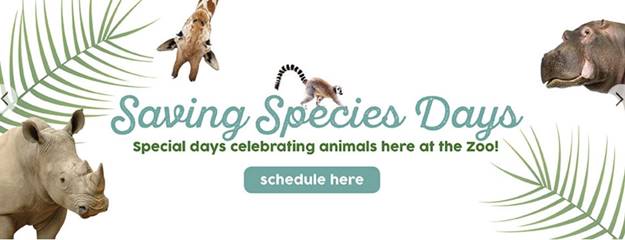
TORONTO ZOO DELIVERS MISSING INFORMATION
CRITICAL TO SUSTAINING BIODIVERSITY
TORONTO, ON, Tuesday, May 7, 2019: Despite volumes of data currently available on mankind, it is surprising how little we know about other species. A recently published paper in the journal Proceedings of the National Academy of Sciences (PNAS) – using data recorded by Toronto Zoo in collaboration with other zoos and aquariums worldwide – confirms that critical information, such as fertility and survival rates, is missing from global data for more than 98 percent of known species of mammals, birds, reptiles, and amphibians.
It’s a gap with far-reaching implications for conservationists seeking to blunt the impact of mass extinctions. At a minimum, scientists working worldwide on behalf of IUCN Red List, IUCN Species Survival Commission, Convention on International Trade in Endangered Species of Flora and Fauna (CITES), TRAFFIC, Monitor, and others require more complete data to make informed decisions.
That changed when researchers added data from a previously untapped source, the Zoological Information Management System (ZIMS). Across classes of species, key blanks fill with salient data. Toronto Zoo records their animal data in ZIMS, which is curated by wildlife professionals working within zoos, aquariums, refuge, research, and education centers in 97 countries. It is maintained by Species360, a non-profit member-driven organization that facilitates information sharing among its nearly 1,200 institutional members, and is the world’s largest set of wildlife data. Toronto Zoo has been contributing data on their animals since 1973. Since then, they have added data on 34,723 birds, reptiles, amphibians, and mammals of 1,177 species, making a huge impact on the understanding of those species’ life histories.
Incorporating ZIMS boosted the Species Knowledge Index eightfold for comprehensive life table information used to assess populations. Information on the age of first reproduction for females, a key piece to estimating how a population will fair in coming years, grew as much as 73 percent.
“Toronto Zoo is committed to increasing our understanding of the world’s species and recognizes the importance of connecting people to the natural world,” says Dolf DeJong, Chief Executive Officer, Toronto Zoo. “Being able to contribute important information, therefore enabling the ability to fill in those missing data gaps is an accomplishment we are proud to be a part of.”
A multidisciplinary team led by Species360 Conservation Science Alliance, with participants from 19 institutions, believes we can substantially increase what we know by applying new analytics to data that has been long overlooked – using data contributed by Toronto Zoo and other zoos and aquariums around the world.
“It seems inconceivable. Yet scientists tasked with saving species often have to power through with best-guess assumptions that we hope approximate reality,” says researcher and Species360 Conservation Science Alliance director Dalia A. Conde. “Class by class, from mammals through amphibians, we saw large gaps fill with fundamental data needed to help conservationists assess populations and advocate for threatened, endangered, and vulnerable species.”
Predicting when species are at risk, and how best to bolster populations, requires knowing at what age females reproduce, how many hatchlings or juveniles survive to adolescence, and how long adults live. To understand what data are currently available, and to measure the void, researchers developed a Species Knowledge Index (SKI) that classifies available demographic information for 32,144 known species of mammals, birds, reptiles and amphibians.
This critical information outlined above is particularly timely given a recent report, issued by the United Nations Intergovernmental Science-Policy Platform on Biodiversity and Ecosystem Services, stating that “nature is declining globally at rates unprecedented in human history — and the rate of species extinctions is accelerating, with grave impacts on people around the world now likely.” The Toronto Zoo is a national leader in saving wildlife and is committed to ensuring the rich diversity of nature for future generations.
About Toronto Zoo
The Toronto Zoo is Canada’s premier zoo and a national leader in saving wildlife to ensure the rich diversity of nature for future generations. More than a tourist attraction, the Toronto Zoo boasts a number of leading programs for helping wildlife and their natural habitats – from species reintroduction to reproductive research. A world-class educational centre for people of all ages, the Toronto Zoo is open every day except December 25 and attracts approximately 1.3 million visitors each year. Toronto Zoo is accredited by CAZA (Canada's Accredited Zoos and Aquariums) and AZA (Association of Zoos and Aquariums). Look for these logos whenever you visit a Canadian zoo as your assurance that you are supporting a facility dedicated to providing excellent care for animals, a great experience for you, and a better future for all living things. For more information, visit caza.ca and aza.org.
About Species360
Species360, a non-profit NGO and global leader in wildlife care and conservation, mobilizes a network of more than 1,100 zoo, aquarium, university, research and governmental members worldwide to improve animal welfare and species conservation. Our members address today’s most urgent wildlife issues, including establishing best practices in husbandry, enrichment, medical care, welfare, reproduction, population management, and biodiversity.
Together, Species360 members curate the Zoological Information Management System (ZIMS), the world’s most comprehensive open database of knowledge on more than 22,000 species. ZIMS vastly increases what is known about thousands of species, and is instrumental in identifying sustainability strategies for many of the species assessed as vulnerable, endangered, and extinct in the wild.
Toronto Zoo Media Contacts:
Katie Gray, Supervisor of Public Relations and Events
[email protected] or #416-392-5941
Amanda Chambers, Public Relations and Events Associate
[email protected] or #416-392-5974





